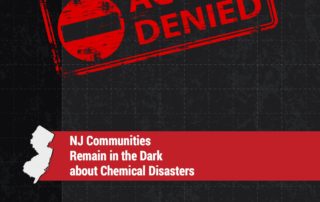NJTV: Concern Over Public’s Right to Access Emergency Response Plans
Dan Fatton, WEC executive director, appeared on NJTV News with Mary Alice Williams to discuss WEC's latest report, ACCESS DENIED. For the interview transcript, please click here. Several clarifications: As noted in the report, an estimated 12 million people live or work within the danger zones of NJ facilities; however, not all those people are NJ residents. EPCRA is the Emergency Planning and Community Right-to-Know Act, a 1986 federal law created to help communities plan for chemical emergencies. SERC is the State Emergency Response Commission. ACCESS DENIED REPORT
